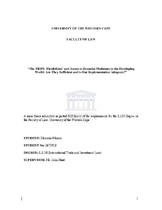The TRIPS flexibilities and access to essential medicines in the developing world: are they sufficient and is our implementation adequate?
Abstract
The underlying rational behind the protection of intellectual property rights is to strike a balance between the interests of intellectual property rights holders on the one hand and users of protected knowledge on the other hand. This thesis sought to achieve the following objectives: to create a good understanding of the historical development of the primary and secondary legal instruments related to the intellectual property rights/public health debate; to determine to what extent a balance is struck by the Agreement on Trade Related Aspects of Intellectual Property Rights with reference to the flexibilities provided for in the Treaty, read together with the subsequent World Trade Organization Ministerial Declarations and TRIPS Council Decisions; to evaluate the extent to which selected developing and least developed country members of the World Trade Organization have taken measures to implement the said flexibilities, taking cognizance of their relevant strengths and weaknesses; to suggest ways in which select countries in the developing world specifically India and Zambia can take greater advantage of the flexibilities to promote better access to medicines which taking into consideration various opportunities and threats that are foreseeable; to identify public health aspects of TRIPS that the developing country and least developed countries World Trade Organization members would do well to address in further negotiations.

